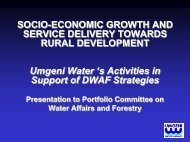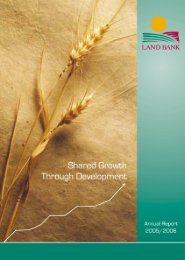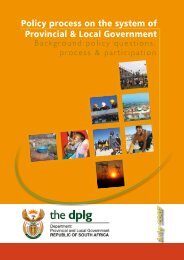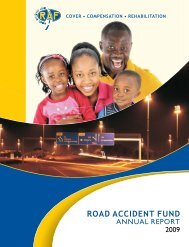Report on an Audit of Government's Poverty Reduction Programmes ...
Report on an Audit of Government's Poverty Reduction Programmes ...
Report on an Audit of Government's Poverty Reduction Programmes ...
Create successful ePaper yourself
Turn your PDF publications into a flip-book with our unique Google optimized e-Paper software.
1.1 BackgroundSince the new government came into power in 1994, it has shown great commitment in addressing the m<strong>an</strong>yinequalities inherited from the previous apartheid government. Over the last twelve years, Government hasdramatically increased the proporti<strong>on</strong> <strong>of</strong> public resources allocated to social spending. Income support tovulnerable households through social security <strong>an</strong>d social assist<strong>an</strong>ce gr<strong>an</strong>ts increased from R10b in 1994 to R70bin 2006 (PCAS, 2003; M<strong>an</strong>uel, 2006).In additi<strong>on</strong>, Government has embarked <strong>on</strong> a number <strong>of</strong> initiatives to exp<strong>an</strong>d healthcare, provide public infrastructure,build houses <strong>an</strong>d provide free basic services such as water <strong>an</strong>d electricity (M<strong>an</strong>uel, 2006). All these are guided by<strong>an</strong> overall commitment to combat under-development <strong>an</strong>d create a better life for all.In his 2004 Address to the First Joint Sitting <strong>of</strong> the Third Democratic Parliament, the President outlined thefollowing three pillars as the basis <strong>of</strong> Government’s strategy <strong>of</strong> fi ghting under- development <strong>an</strong>d poverty in thecountry. These are:“• encouraging growth <strong>an</strong>d development in the First Ec<strong>on</strong>omy;• increasing the opportunity for jobs <strong>an</strong>d addressing the challenges <strong>of</strong> the Sec<strong>on</strong>d Ec<strong>on</strong>omy; <strong>an</strong>d• building a social security net to bring about poverty alleviati<strong>on</strong>.” (Mbeki, 2004).Analysts have pointed out that the elements <strong>of</strong> this approach are largely the same as those laid out in the WhitePaper <strong>on</strong> Rec<strong>on</strong>structi<strong>on</strong> <strong>an</strong>d Development (RDP) <strong>of</strong> 1994 (Aliber <strong>an</strong>d Nhlapo-Hlope, 2005). The primaryobjectives <strong>of</strong> the RDP were to improve the st<strong>an</strong>dards <strong>of</strong> living <strong>an</strong>d quality <strong>of</strong> life for all South Afric<strong>an</strong>s <strong>an</strong>d tocreate a sustainable democracy by prioritizing poverty eradicati<strong>on</strong>, access to l<strong>an</strong>d <strong>an</strong>d providing basic services topeople within a peaceful <strong>an</strong>d stable society characterized by equitable ec<strong>on</strong>omic growth.In studies <strong>on</strong> service delivery improvement <strong>an</strong>d m<strong>on</strong>itoring <strong>an</strong>d evaluati<strong>on</strong>, the PSC has identifi ed several factorsthat remain challenges in the achievement <strong>of</strong> the above RDP objectives. One <strong>of</strong> these factors is the inappropriateprocesses <strong>an</strong>d practices adopted in the govern<strong>an</strong>ce <strong>an</strong>d implementati<strong>on</strong> <strong>of</strong> government programmes. Researchc<strong>on</strong>ducted by the Public Service Commissi<strong>on</strong> (PSC) into the nati<strong>on</strong>al housing subsidy scheme showed that itwas c<strong>on</strong>strained by factors such as poor coordinati<strong>on</strong> <strong>an</strong>d the poor integrati<strong>on</strong> <strong>of</strong> service delivery systems <strong>an</strong>dprocesses (PSC, 2003). Other problems that have been identifi ed by the PSC are that project m<strong>an</strong>agementsystems are <strong>of</strong>ten not introduced, criteria for support are not clearly defi ned <strong>an</strong>d results are not m<strong>on</strong>itoredor evaluated. This has resulted in Government c<strong>on</strong>cluding as part <strong>of</strong> the Ten Year Review that more directinterventi<strong>on</strong>s are needed.To achieve the objective <strong>of</strong> halving poverty by 2014 as stipulated in the Ten Year Review, released in October 2003,<strong>an</strong>d in accord<strong>an</strong>ce with the Millenium Development Goals (MDGs), it is essential to improve the perform<strong>an</strong>ce<strong>of</strong> Government. The PSC’s State <strong>of</strong> the Public Service <str<strong>on</strong>g>Report</str<strong>on</strong>g> <strong>of</strong> 2004 highlights the need for Governmentto accelerate social development <strong>an</strong>d address poverty more effectively to ensure that the above objective isachieved. Research undertaken by the HSRC has pointed out that poverty c<strong>an</strong>not be reduced by improvingperform<strong>an</strong>ce <strong>of</strong> Government per se. The prevailing pro-poor c<strong>on</strong>diti<strong>on</strong>s need to be identifi ed <strong>an</strong>d the availablenatural, hum<strong>an</strong> <strong>an</strong>d ec<strong>on</strong>omic resources utilised to bring about the kind <strong>of</strong> ec<strong>on</strong>omic growth where the poorshare equally in the proceeds (Aliber <strong>an</strong>d Nhlapo-Hlope, 2005). Improving road access to ec<strong>on</strong>omic centreswhere people c<strong>an</strong> fi nd employment, raising the st<strong>an</strong>dard <strong>of</strong> educati<strong>on</strong> <strong>an</strong>d improving access to health facilitiesare all factors that need to be c<strong>on</strong>sidered when implementing programmes <strong>an</strong>d projects aimed at improving thest<strong>an</strong>dard <strong>of</strong> living <strong>of</strong> people in South Africa.It is against this background that the PSC identifi ed the need to evaluate Government’s poverty relief programmeto see to what extent it has impacted <strong>on</strong> under-development, poverty <strong>an</strong>d inequality in the country, especially inrelati<strong>on</strong> to the three pillars highlighted by President Mbeki. Of great import<strong>an</strong>ce to <strong>an</strong>y evaluati<strong>on</strong> <strong>of</strong> this nature2


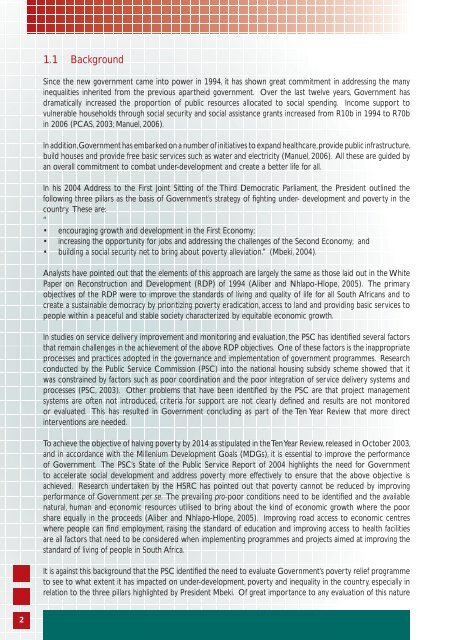
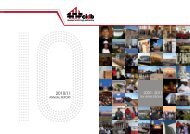
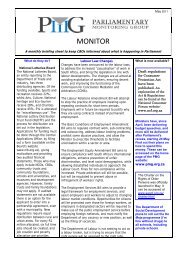
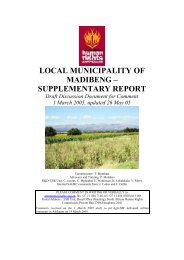
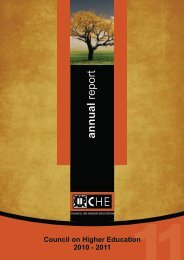
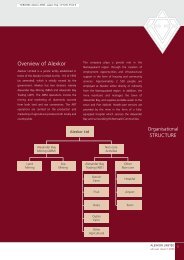
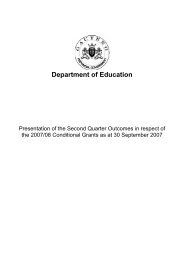
![National Research Foundation Annual Report 2008 / 2009 [Part 2]](https://img.yumpu.com/49774036/1/177x260/national-research-foundation-annual-report-2008-2009-part-2.jpg?quality=85)
